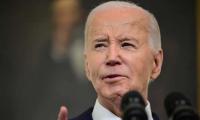Comment
My driver was late for work yesterday and subsequently was I. He was livid for being trapped in traffic that halted him for over 40 minutes and hundreds others who in turn bartered verbal volleys with policemen for protecting “VIPs” at the cost of public consternation. So who was the VIP, I inquired, for VIPs venture in and out of Islamabad like ants in a colony. Hamari zillat to baray log he kartay hain (only important people cause our humiliation) was his frank retort. His demeanour changed when I told him the extraordinary security was to protect the mother and wife of the Indian spy on death row as they made their way home after meeting him at the Pakistani Foreign Office. Phir to bunta hey (then it was due), he said and returned his attention to focus on the more-than-messy Rawalpindi traffic.
Kulbhushan Sudhir Jadhav met his mother, Avanti and his wife, Chetankul at the Agha Shahi block of the Foreign Office at the capital’s Constitution Avenue. The Monday meeting was no ordinary event by any standard. It is hard to predict how India would have reacted had they captured a Pakistani spy with similar credentials. Jadhav, a serving Indian Navy commander was arrested on 3 March 2016 in a counter-intelligence operation in Balochistan. Hussain Mubarak Patel was effectively his nom de guerre. During interrogation, he confessed to spying, subterfuge, subversion and sabotage. His special tasks included death and destruction in Balochistan, Sindh, Karachi and China-Pakistan Economic Corridor (CPEC). As per his own words he was here “to destabilise and wage war against Pakistan.” The then DG ISPR and currently head of the Southern Command Lieutenant General Asim Bajwa had described the arrest as a “big achievement”.
Jadhav admitted to working for India’s Research & Analysis Wing (RAW). India refutes his admission and claims Jadhav was a naval office retired prematurely with no links to government and stresses his confessions might have been extracted under duress. Expecting any other explanation from a government whose officials’ statements are littered over social media professing plans to further bifurcate and debilitate Pakistan as India did in 1971 would be a fallacy.
Pakistan’s choice of picking up the Christmas Day for the Jadhavs’ meeting was indeed ingenious. The world was closed to commemorate Nativity festivities. Pakistan was closed to mark Quaid-i-Azam’s birthday. Islamabad was less chaotic from security point of view and with an otherwise dry day for want of government stories a lead would be a given for Boxing Day. Well at least in Pakistan if not in India.
The event was spiced with a pre-recorded video of Jadhav thanking the Pakistani government and a medical report by a doctor of the Saudi German Hospital in Dubai claiming he was in good health. Foreign Office spokesman Dr Mohammad Faisal also tweeted photos of the meeting as much of politics is played through Twitter and Facebook these days. Doubts were immediately raised in Delhi that the video may have been shot under duress. Credibility of the medical report was questioned too. But Jadhav looked sharp and in shape. India and Indians should have waited before firing the doubt missiles for it were they who did not agree to Jadhav’s mother and wife speaking to media and telling their story. Indian officials were also not agreeable to the idea of Indian media being present and possibly asking some painful questions.
Social media being the most unsocial platform went expectedly viral for a few hours. Most of it was angry and unreasonable. But some points of view are palatable – at least from a humanitarian or even Indian perspective. For example, Shashi Tharoor, a Congress MP in Lok Sabha from Thiruvananthapuram, described the meeting as a “step forward” but opined that “the way it unfolded was deeply unsatisfactory.”
Of course, Tharoor would not comment on the gross nature of Jadhav’s brief or the gravity and grimness of his actions but he touched on the familial emotionality of the exercise by saying, “they ( the mother and wife) could not touch him, hold him. That was emotional and painful for them. It was an unhumanitarian spirit in the way it conducted. At least we know he's alive. Let's accept that something is better than nothing.”
One wonders what would men like Mr Tharoor say to mothers, fathers, wives, siblings or children of those killed in activities conceived, coordinated and carried out by men like Kulbhushan Jadhav. Since the matter of Jadhav’s culpability and criminality lies in an international court, let's leave it at that. We know that the world court ordered Pakistan in May to delay Jadhav's execution, and said Islamabad had violated a treaty guaranteeing diplomatic assistance to foreigners accused of crimes. Pakistan authorities, in turn, say Jadhav confessed to being ordered by India's intelligence service to conduct espionage and sabotage in Balochistan. For Pakistan Jadhav plainly remains “a spy and terrorist who has been sentenced to death”.
The upshot of Christmas Day tete-a-tete is that it happened. What was discussed between a son and the mother and what a man and his wife spoke about while officials watched would remain a guessing game for now. Ideally, one must desist from such a frivolity. But this is a serious matter and would become serious still in coming days and months. Twitterati have suggested a spy swap somewhere down the line where Jadhav could be bartered for a retired Pakistani colonel who disappeared in Nepal some time ago. Who knows?
For now, Pakistan has kept a door open for future meetings between Jadhav and his family. Its spokesman has once again laid bare the facts of Jadhav’s activities in Pakistan for the world and Indians to see and stomach. It remains too early to predict how the case would progress in the international court and what would be the final outcome of this ghastly episode of blood and terror. But most Pakistanis want Jadhav punished for his sins and not let out like the notorious American Raymond Davis through a backdoor deal.
Anything on those lines would be very difficult for the military leadership to sell to the people of Pakistan as a Field General Court Martial (FGCM) sentenced Jadhav to death. The civilian governments wouldn’t dare venture into that domain. It can be suicidal. So for now, the son, the wife and the mother can find solace in the fact that they were allowed to meet each other for forty minutes. Next time it might be for a longer period of time. The legal and diplomatic niceties guarantee that Jadhav would be around for some time before….well again, who knows?
Awami Muslim League chief appeared in the court with his lawyers Sardar Raziq and Sardar Shehbaz
Board meeting also allowed increase in business center and commercial area of hotel plots from 5 to 10 percent along...
Foreign exchange reserves currently stand at $8 billion, while Pakistan would also receive $1.1 billion IMF tranche:...
CM directed that the enforcement authorities be made functional in six months, and legislation in this regard be...
Pakistani soldiers and policemen stand guard outside the Haripur central jail. — AFP/FileWASHINGTON: The Pakistani...
Establishment Division has also issued an NoC to fill 465 civilian posts in the Ministry of Defence and 11 posts in...







